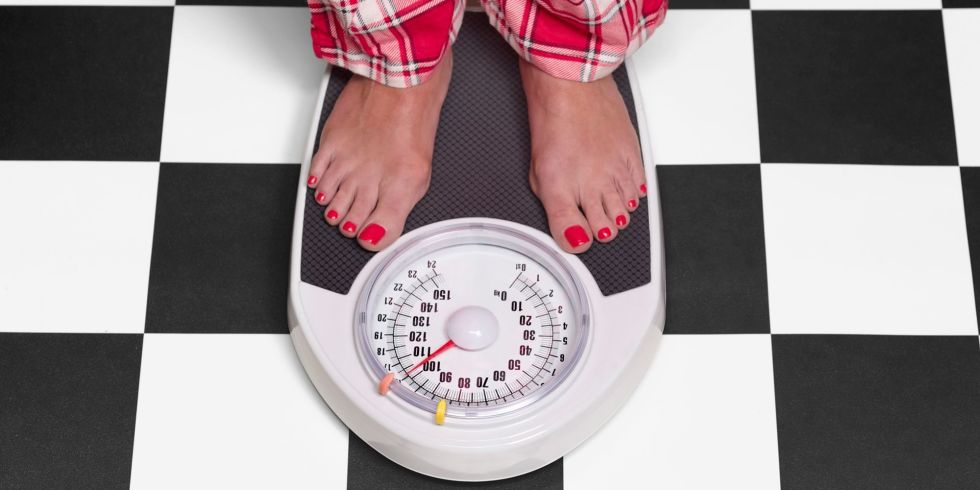If you’re on a #newyearnewme hype just like the rest of the country this January, the chances are you’ll have health and fitness on the agenda. So many of us do. Because what better time to change all our unhealthy eating habits than at the start of a fresh, brand new year?
And while this doesn’t mean losing weight for everybody, it’s certainly the goal for some people after Christmas. But it’s pretty important when trying to shed some pounds that you do it sensibly – and that means ignoring some of the age-old advice you’ve previously believed.
‘We live in a society where we are desperate for quick fixes, in all aspects of our lives. We want the fastest, easiest route to the results we desire, and that’s why so many of us have ended up on the yo-yo diet mill,’ says psychotherapist Karina Melvin, who’s written the book Artful Eating: The Psychology of Lasting Weight Loss.
But ditching the fad diets, Karina says, will pave the way to being able to lose weight steadily and healthily and in a way that’s easily maintainable and even slightly enjoyable.
Here’s some weight loss myths you should stop believing asap to help get you started:
Weight-loss myth #1: People who are overweight have slower metabolic rates
Truth: ‘Studies comparing the resting energy expenditure of overweight people and lean people show little difference in basal metabolic rates. The ones that do demonstrate a difference show overweight people actually have higher metabolic rates. So basically, it’s time to let go of the idea that you just have a slow metabolism.’
Weight-loss myth #2: You must have the obesity gene if you struggle to lose weight
Truth: ‘Our genetics do not determine us. Half of the population have a version of FTO (the obesity gene) that contains one small change. These people are on average 3.3 lb heavier and 25 percent more likely to become obese. Roughly one in six of us are unlucky enough to have two small changes, or a double-risk variant of FTO, and are on average 6.6 lb heavier and typically 50 percent more likely to become obese.
‘While people with these changes are less likely to feel satiated as quickly as those who do not have the variants, that doesn’t mean that they are fated to be overweight. There are many people who possess these variants who manage to maintain their desired weight and have learned to manage their hunger in a healthy way.’
Weight-loss myth #3: To lose weight you should eat diet food and avoid all carbohydrates, sugars and fat
Truth: ‘Our body isn’t designed to break down the artificial flavourings and sweeteners in so-called diet foods, so it’s actually much better for us to eat and drink the real full-fat versions when it comes to real butter, milk and cheese. We are completely duped by food companies and labelling requirements that make us think a food is healthy.
‘If the label says, “healthy choice”, “low in fat” or “low in sugar”, it must be good for you, right? What you should ask yourself is: what are they replacing the fat or the sugar with? The answer is artificial chemical products and flavourings that our body doesn’t know how to metabolise and which ultimately make us sick and overweight.”

Weight-loss myth #4: Counting calories is the only way to lose weight
Truth: ‘Yes, counting calories and limiting your daily calorie intake will lead to weight loss. But let me ask you this: are you prepared to count calories forever and control what you eat for ever? Honestly, how long can you stick to a strict regime, weighing out your food, avoiding eating out or at your friends’ house because you’re trying to maintain that strict regime? As soon as you stop counting calories, the weight will pile back on.
‘Also, not all calories are created equal. You can drink diet fizzy drinks all day long because they contain hardly any calories, but they wreak havoc on your body, your metabolism and your gut microbes. Eating artificially developed low-calorie foods actually leads to weight gain, because they interfere with our body’s natural way of breaking down and storing food.’
Weight-loss myth #5: Losing weight means depriving yourself of the foods you love
Truth: ‘This is one of the main reasons diets don’t work: they are unsustainable because we have to eliminate so many of the things we enjoy eating. It makes it so difficult for us to eat out, go to a party, drink alcohol and just enjoy a healthy balanced lifestyle. But the reverse is true! When we eat foods filled with flavour that we enjoy, we absorb more nutrients from them. Our body responds by speeding up our metabolism and letting us know when we feel full, and this is all triggered by the pleasure we experience eating something we enjoy. So, we eat less as we savour and enjoy more.’












